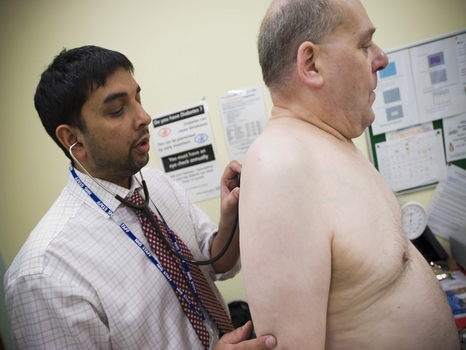GP leaders have expressed concerns over a new campaign urging patients to see their GP if they get out of breath easily.
They said the campaign, which launches on Thursday 14 July and is due to last for four months, had not been properly evaluated and will put undue pressure on GPs.
Public health chiefs said their regional pilot had raised public awareness about potential serious underlying causes of breathlessness but admitted they do not the likely impact on GPs, or whether it will be beneficial overall to people’s health.
The campaign, which will target people over 50 and include TV, radio, print and online advertising, will urge the public to ‘tell your doctor’ if they ‘get out of breath doing things you used to be able to do’.
It will also call on people to go the their GP if they have ‘had a cough for three weeks or more’ – the slogan used in lung cancer awareness campaigning for the last three years.
But Dr Maureen Baker, chair of the RCGP, said the publicity campaigns should be encouraged only if they ‘are based on evidence’.
Dr Baker said: ‘We need to be mindful that carrying out tests on patients who don’t really need them could potentially cause them harm.
‘We also have concerns, whilst general practice is under such intense resource pressures, about our ability to cope with the increase in workload that such an awareness campaign might bring without providing the adequate support.’
Deputy GPC chair Dr Richard Vautrey said GPs ‘will be concerned about the impact of potentially an increased number of consultations as a result of this campaign at a time when many are struggling to offer enough appointments to meet rising patient need’.
He added: ‘Whatever the merits of the campaign, it’s important that PHE take in to consideration the workload and workforce implications and play their role in ensuring practices receive increased funding to support workforce expansion.’
Public Health England (PHE) said the decision to run the campaign was based on ‘positive evidence from the evaluation of the previous campaigns for lung cancer and breathlessness (as a symptom of chronic obstructive pulmonary disease, heart disease and a range of other conditions)’.
The regional pilot raised awareness amongst the public that getting out of breath easily could be a sign of lung disease, from 50% to 60%, as well as heart disease, from 42% to 52%. It also increased awareness that people should ‘see their GP if they are getting out of breath’ from 43% to 59%.
However, PHE told Pulse that the ‘direct impact of the campaign was challenging to assess from the clinical metrics’.
The ‘three-week cough’ national campaign has been linked to increased lung cancer diagnoses, but GP critics have warned it could cause many patients needless anxiety, and lead to delays for other patients as GP and diagnostic services struggle to absorb the increase in appointments and referrals.
PHE declined to respond directly to the GPC and RCGP concerns, but said that ‘qualitative research carried out with GPs in the regional pilot area following the campaign reported that while they while they were unsure if they had seen an increase in presentations for breathlessness, when retrospectively looking at the campaign materials they could recall patients using the same language’.
GPs’ concerns over symptom awareness campaigns
GPs have expressed scepticism about the Government’s publicity campaigns on symptom awareness before.
The ‘three-week cough’ campaign that was initially launched in 2012 – spearheading the ‘Be Clear on Cancer’ series – drew criticism from GP cancer experts who said the message – to visit your GP if you have had a cough for three weeks or more – was too cautious and conflicted with self-care messaging.
Public Health England and Cancer Research UK hailed the campaign a success, based on evidence that it led to the diagnosis of an extra 700 cancers, but GP experts warned the big increase in GP consultations could also have had unintended knock-on effects.
A subsequent ‘blood in pee’ campaign provoked the ire of local GP leaders when public health chiefs decided to re-launch it during the particularly busy autumn period.
And more recently GP specialists have questioned the rationale behind a ‘heartburn’ campaign which they said risked patients being harmed from over-investigation and went against NICE guidance on dyspepsia management.
Pulse October survey
Take our July 2025 survey to potentially win £1.000 worth of tokens

Visit Pulse Reference for details on 140 symptoms, including easily searchable symptoms and categories, offering you a free platform to check symptoms and receive potential diagnoses during consultations.











